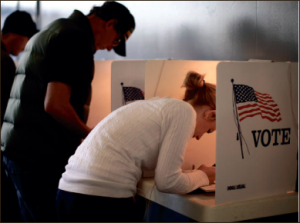Identity crisis at the polls

New measures aimed at bolstering requirements have politicians bickering
Before you board a flight, airport security officials examine your ticket and photo ID. Before issuing you a ticket, a police officer requests your vehicle registration and driver’s license. Before voting, you prove who you are by…just showing up at the polls?
Arguments rage in legislatures, courts and lobbying agencies across the United States over how strict voting laws should be. The Brennan Center for Justice recorded new voting legislation that has been introduced in 41 states. Democrats and minority interest groups insist that stricter legislation hampers voting participation while Republicans state that voters are not discouraged. Why all the fuss?
Identity verification is an everyday process in American life. If our airports, police and liquor stores require you to prove that you are who you say you are, our voting precincts should aim to do the same. The new wave of voting laws seek to modernize and streamline the American voting process by adding another checkpoint to our lives.
The New York Times reported that Attorney General Eric Holder Jr. referred to our voter registration system as “antiquated” in 2011. That is one comment both parties agree on. Unsurprisingly, Democrats and Republicans disagree on the solution. The Republican-backed voting laws encompass three main areas: proof of identification, proof of citizenship and more challenging registration.
Proof of identification means that in such states as Alabama, Tennessee and Pennsylvania, you must present a photo ID to vote.
Virginia chose a more lenient approach, allowing voters to present a variety of acceptable IDs. The identification law has been challenged in states such as Pennsylvania, but Pennsylvania Commonwealth Court Judge Robert Simpson laid the situation bare, stating that laws are “merely an election regulation to verify a voter’s identity.”
Even more contentious is legislation requiring proof of citizenship to vote. Alabama, Kansas and Tennessee require you to present an article such as your birth certificate before voting. Such legislation hopes to prevent repeating scandals such as when Colorado’s secretary of state admitted in a 2011 congressional testimony that 11,000 non-citizens were registered to vote in Colorado.
As states are raising voting standards to protect our democratic system, the Democratic party and minority interest groups fear that students, the elderly or racial minorities will not meet voting requirements. Yet American voters and past elections point to the positive affect of stringent voting laws.
A University of Missouri study published in 2006 found that during an election that year in Indiana, the first to require identification, voter turnout actually increased overall. The uptick in turnout is telling, but The American University Center for Democracy went one step further and surveyed registered voters in Maryland, Mississippi and Indiana. This 2008 study revealed that “more than two-thirds of respondents believe the U.S. electoral system would be trusted more if voters were required to show a photo ID.”
Rather than deterring or preventing particular groups from voting, stricter voting requirements increase trust and turnout for the American election process. A collaborative 2007 study by Jason D. Mycoff and David C. Wilson of the University of Delaware and Michael W. Wagner of the University of Nebraska-Lincoln states that “concerns about voter identification laws affecting turnout are much ado about nothing.”
The debate over whether politicians like stricter voting requirement is far from over. Yet Americans seems sure, and state governments actually seem ready, to prove that their vote is their own, and no one else’s.

